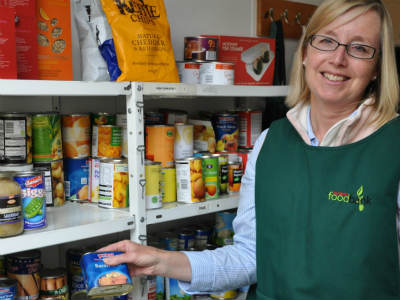
Social care professionals and other agencies are referring more and more people in crisis to food banks on the back of welfare cuts, and the problem could be exacerbated by plans to scrap the national Social Fund, say charities.
| About food banks The Trussell Trust’s network of over 250 food banks collects non-perishable, in-date food items from schools, churches, businesses or individuals. Volunteers then sort the food into boxes or parcels to be delivered to or collected by people unable to feed their families. Statutory agencies or citizens advice bureaux working in partnership with the banks provide a food bank voucher for people in need. This role can be performed by council social workers for their clients. The eligibility criteria would be determined by the agency concerned. The vouchers can be redeemed for three days’ emergency food. Clients are restricted to three vouchers. If they are still in crisis after three vouchers the referring professional can make a special application to the food bank to provide further vouchers to the family. Source: The Trussell Trust
|
Citizens Advice Scotland (CAS) today reports a doubling in applications from citizens advice bureaux for charitable support for clients from 2009-10 to 2011-12, mainly for essential goods such as food. This follows news of a doubling in the number of people supported through the Trussell Trust’s food bank network from 2010-11 to 2011-12, to almost 128,697.
“The [CAS] report reveals a Dickensian situation facing many of Scotland’s low paid workers and people who rely on welfare benefits,” said CAS chief executive Margaret Lynch. “Sadly this indignity is about to be inflicted on many more of our fellow Scots as welfare changes begin to bite.”
CAS attributes the rise to mounting food prices and benefit cuts and changes, particularly: tightening eligibility for the Social Fund, including a limit of three crisis loan awards for living expenses per client in a 12-month period; penalties for jobseeker’s allowance claimants who fail to meet requirements that they are actively seeking work; and delays in the processing of benefits.
More demand for food banks
And the Trussell Trust has signalled that it expects a further rise in demand for food banks from next year with the scrapping of the national discretionary Social Fund, which provides crisis loans and community care grants to people in emergencies. A reduced budget will be devolved from the Department for Work and Pensions to local authorities to provide their own emergency welfare services, though with no requirements to do so and no national eligibility criteria.
CAS said that some council social work departments in Scotland were already providing food parcels to clients in need, while the trust said that it expected “frontline care professionals to refer more people in crisis” to food banks as a result of the localisation of the Social Fund.
Social workers’ role
It is not clear how far social workers or other care professionals will be involved in delivering or determining eligibility for councils’ localised welfare schemes, though some involvement is expected. Councils are considering setting up integrated assessment procedures for these and other discretionary welfare funds, such as payments to families to support children in need under section 17 of the Children Act 1989, said a recent Child Poverty Action Group (CPAG) report looking at plans to implement the changes in London.
The CPAG report also said one council was considering restricting applications to its new fund to people referred by social workers, but raised concerns that this could disadvantage families not in touch with social services. Warnings have already been expressed that social workers’ relationships with clients could be damaged if professionals were given the power to decide on eligibility for financial payments.
Related articles
Fears for social work role as councils take over poverty fund


 Bournemouth, Christchurch and Poole
Bournemouth, Christchurch and Poole  Hampshire County Council
Hampshire County Council  Lincolnshire County Council
Lincolnshire County Council  Norfolk County Council
Norfolk County Council  Northamptonshire Children’s Trust
Northamptonshire Children’s Trust  South Gloucestershire Council
South Gloucestershire Council  Wiltshire Council
Wiltshire Council  Wokingham Borough Council
Wokingham Borough Council  Children and young people with SEND are ‘valued and prioritised’ in Wiltshire, find inspectors
Children and young people with SEND are ‘valued and prioritised’ in Wiltshire, find inspectors  How specialist refugee teams benefit young people and social workers
How specialist refugee teams benefit young people and social workers  Podcast: returning to social work after becoming a first-time parent
Podcast: returning to social work after becoming a first-time parent  Podcast: would you work for an inadequate-rated service?
Podcast: would you work for an inadequate-rated service?  Family help: one local authority’s experience of the model
Family help: one local authority’s experience of the model  Workforce Insights – showcasing a selection of the sector’s top recruiters
Workforce Insights – showcasing a selection of the sector’s top recruiters 

 Facebook
Facebook X
X LinkedIn
LinkedIn Instagram
Instagram
Comments are closed.